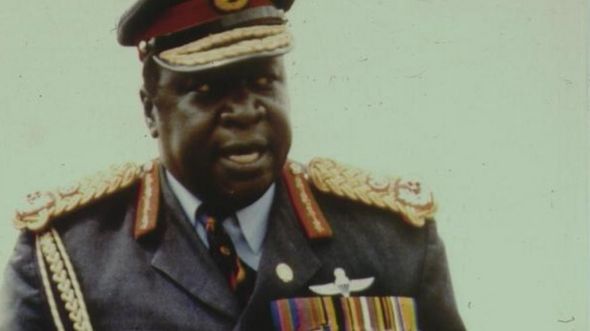
Image copyrightAPImage captionIdi Amin never stood trial for the abuses committed during his rule.)=(
A candidate in Uganda's presidential elections has promised to repatriate the remains of the former dictator, Idi Amin, and build a museum in his honour.
Amama Mbabazi, a former prime minister, is quoted as saying that the move would help reconcile Ugandans divided over the legacy of Amin and other leaders.
Mr Mbabazi is running against President Yoweri Museveni in next week's polls.
Amin's rule was notorious for its brutality. He was overthrown in 1979 and died in exile in 2003.
An armed forces chief under President Milton Obote, Amin seized power in a coup in 1971. He ordered the expulsion of Uganda's Asian community a year later.
He became infamous for his capricious behaviour and for his punishment of political opponents. Some 400,000 people are estimated to have been killed while he was in power.
Amin fled Uganda in 1979, seeking refuge in Libya, Iraq and eventually Saudi Arabia, where he would remain for the rest of his life.
'Labelling of Ugandans'
Mr Mbabazi made his promise to repatriate Amin's remains on a visit to the former dictator's ancestral home in north-west Uganda.
His spokeswoman said his party was campaigning for reconciliation and for the "forgiveness for any real or perceived wrongs in the past".
"The issue of Idi Amin is one of them," she told the AFP news agency.
Mr Mbabazi meanwhile told the state-owned New Vision newspaper that he wanted to end "the labelling of Ugandans" as Amin's people, Obote's people and Museveni's people.
Mr Museveni has been in power for 30 years and is seeking a fifth term as president. Mr Mbabazi is one of seven candidates hoping to unseat him.
A candidate in Uganda's presidential elections has promised to repatriate the remains of the former dictator, Idi Amin, and build a museum in his honour.
Amama Mbabazi, a former prime minister, is quoted as saying that the move would help reconcile Ugandans divided over the legacy of Amin and other leaders.
Mr Mbabazi is running against President Yoweri Museveni in next week's polls.
Amin's rule was notorious for its brutality. He was overthrown in 1979 and died in exile in 2003.
An armed forces chief under President Milton Obote, Amin seized power in a coup in 1971. He ordered the expulsion of Uganda's Asian community a year later.
He became infamous for his capricious behaviour and for his punishment of political opponents. Some 400,000 people are estimated to have been killed while he was in power.
Amin fled Uganda in 1979, seeking refuge in Libya, Iraq and eventually Saudi Arabia, where he would remain for the rest of his life.
'Labelling of Ugandans'
Mr Mbabazi made his promise to repatriate Amin's remains on a visit to the former dictator's ancestral home in north-west Uganda.
His spokeswoman said his party was campaigning for reconciliation and for the "forgiveness for any real or perceived wrongs in the past".
"The issue of Idi Amin is one of them," she told the AFP news agency.
Mr Mbabazi meanwhile told the state-owned New Vision newspaper that he wanted to end "the labelling of Ugandans" as Amin's people, Obote's people and Museveni's people.
Mr Museveni has been in power for 30 years and is seeking a fifth term as president. Mr Mbabazi is one of seven candidates hoping to unseat him.
